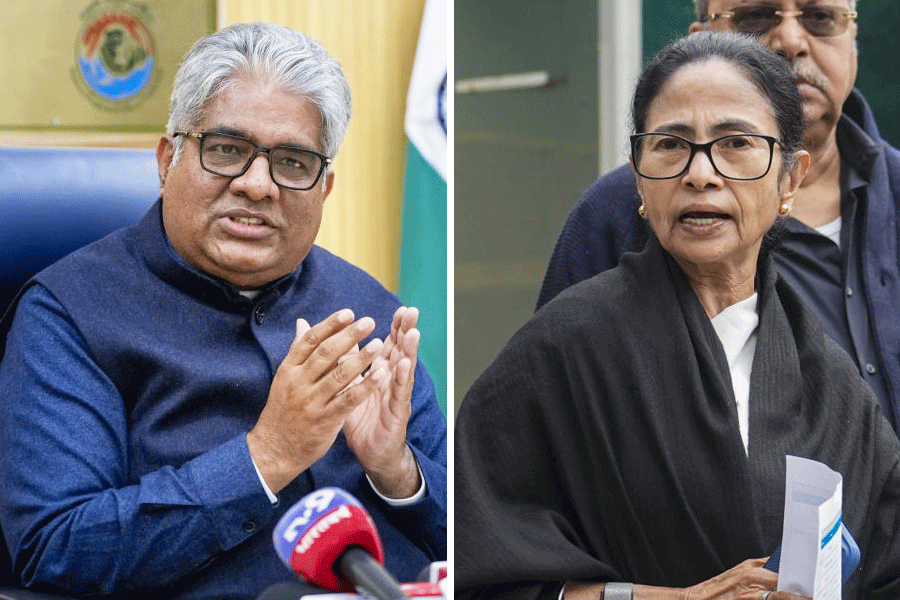From 250 films in the year 2016 to 25 in 2024, the Bengali film industry witnessed a drastic drop in the number of films made annually, said filmmaker Bidula Bhattacharjee, attributing this downward spiral to the alleged interference of Federation of Cine Technicians and Workers of Eastern India in Tollywood directors’ work.
Her statement came on Friday, a day after the Calcutta high court issued a ruling in favour of Bhattacharjee, directing the Federation of Cine Technicians and Workers of Eastern India — headed by Trinamool Congress minister Aroop Biswas’s brother Swarup Biswas — to refrain from interfering with directors’ right to work and livelihood.
The court's decision came in response to a writ petition filed by Bhattacharjee, supported by several eminent names from Tollywood.
Speaking to The Telegraph Online, the 38-year-old director, who has helmed Prem Amar 2 and Golper Mayajal, said she was feeling “very positive” following the directive.
“As a filmmaker, I would like to stay away from politics and tell stories without having to think about anything apart from the creative aspect. I want to cherish my freedom of storytelling with whatever fund I can accumulate,” she said.
How the conflict affected filmmakers’ work and livelihood
Bhattacharjee traced the genesis of the conflict to 2023, when filmmaker Rahool Mukherjee was blacklisted by the federation for shooting in Bangladesh.
“We went on strike as this was a violation of a director’s freedom to create,” she said, recalling how the strike was called off following chief minister Mamata Banerjee’s intervention and an assurance that a regulatory body would be formed.
But the promises never materialised, said Bhattacharjee. “It was an eyewash, only to make us stop our strike and get back to work.”
Over time, she added, the federation continued to blacklist directors, flouting the CM’s directive. “Even a National Award-winning filmmaker like Kaushik Ganguly had to face this insult,” she said.
Bhattacharjee highlighted how arbitrary rules and an atmosphere of fear have crippled the Bengali film industry. “We were threatened and insulted every day. Independent filmmakers like me started losing producers and financiers who were afraid that the federation might ban us at any time.”
“The bigger picture is, from more than 250 films in the year 2016 we are down to 25 films a year. Isn’t this affecting the livelihood of technicians?” she asked.
“Saw big directors switch sides because of fear”
Asked whether she feared backlash, given the political clout of Swarup Biswas, Bhattacharjee admitted, “I saw big directors switch sides because of this fear. I would be lying if I said I had no fear. But the determination to not keep quiet knowing that whatever is happening is wrong is what drove me past this fear.”
The petition filed by Bhattacharjee was supported by prominent actor-directors Parambrata Chattopadhyay and Anirban Bhattacharya, and filmmakers Sudeshna Roy and Subrata Sen, among others — all key members of the Directors’ Association of Eastern India (DAEI). They alleged that the federation had denied them health insurance and pressured other guilds to blacklist them.
“Don’t force us to take hairdressers for bald characters”
With the court’s interim directive protecting her right to work, Bhattacharjee now hopes for systemic reforms. “I would like to see junior technicians and directors working hand in hand like before. Don’t force us to take a hairdresser even if the characters are bald. Let us take only the crew we need.”
She believes that simplification of rules will help revive Kolkata as a shooting destination for filmmakers from outside the state, which in turn would generate more employment. “We need more films being made in Bengal — by us and by those who come from outside.”
The court has asked the Department of Information and Cultural Affairs to submit a report before the next hearing on May 19. “Expectations from the court have so far been very positive… So we are hoping for the best, for our film industry,” Bhattacharjee added.










